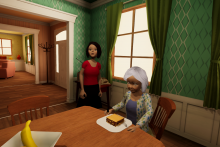The Alzheimer Care Trainer (ACT) is a computer simulation where you can practice communication with people with Alzheimer disease in various stages, explains Theune, assistant professor at the Human Media Interaction group. ‘You can try out different situations and strategies on how to approach the patient. You can test different responses in a safe environment and try things that you might otherwise not do in real life.’
Support for the family
The game environment is designed to resemble real life, more specifically a regular household. ACT is focused on family caregivers, who live with the patient – or better said – their loved one. ‘This of course comes with many challenges,’ continues the UT scientist. ‘Alzheimer’s patients change their personality due to the disease. Some of them might get aggressive or angry and refuse to do even basic things. That can be very frustrating for the family. This game can help them find better solutions.’
Caregivers can use it to practice typical home scenarios that often happen to people suffering from Alzheimer’s disease. For example, they can test different ways of persuading the patients to brush their teeth or to eat their dinner. ‘The patients are often not hungry or they are not interested, and so you need to find a way to engage them,’ says Theune.
‘All Alzheimer’s patients are different’
Although ACT is a ‘game’, it does not have a winning goal or a fixed storyline. It is dynamic and changes based on your actions. It is also personalized to the specific caregiver. ‘There isn’t one right solution. All Alzheimer’s patients are different, they don’t all have the same symptoms and behavior,’ says Theune. ‘ACT allows you to fill in characteristics of your patient, so that you can familiarize yourself with all the possibilities of dealing with them. This is also important because the symptoms change as the disease progresses, and so you can play the game over and over based on the current situation.’
In development
The ACT has been developed by an international team, including the University of Twente. The UT researchers were mainly responsible for language generation within the game. ‘The game is dynamic, and so you can’t script all the texts ahead of time,’ explains Theune. ‘You need to generate the conversation, also because the game will be available in several languages.’
The first version of the Alzheimer Care Trainer is ready and is now being tested, after which it will be further developed and released to the public. ‘Right now we are focusing on use in households, but it could become part of education for professional caregivers,’ thinks Theune. ‘Overall, we want to support caregivers, because if they feel better, they can also take better care of their loved ones.’







